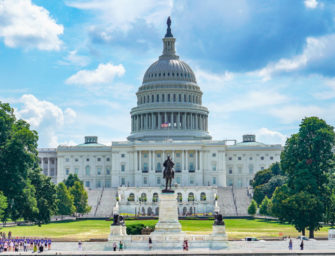AGU at COP28: Driving Change Through Collaboration
The annual UN Climate Change Conference, or COP, is a vital meeting for the global effort to address climate change. This year, COP28’s achievements included the establishment of a loss and damage fund to aid vulnerable nations financially, alongside the consensus from nearly every country to “transition away from fossil fuels”—a milestone in 28 years of international climate negotiation.
As scientists, we want more action from our leaders and for good reasons: our planet is in crisis. But, can we agree that high-level policy is not the only catalyst of change? Realistically, we need to engage organizations at all levels—public and private alike—to tackle issues such as climate intervention, community science, and inequities in both the geosciences and society at large. This is where COP28 comes in.
COP is about more than what’s happening on the main stage. It’s a meeting ground for a universe of organizations to advance objectives, propose new initiatives and meet potential partners. COP is also incredibly diverse—it’s one of the few international spaces where indigenous populations and under-resourced nations are given an opportunity to speak across the table with leaders from global superpowers.
As the world’s largest Earth and space science association, AGU is uniquely positioned to advance climate solutions through our meetings, publications and programs. When I think about AGU’s global engagement strategy, one key theme emerges — the power of partnerships. By sending delegates to COP28, we can build diverse partnerships that not only advance scientific discovery but ensure that the benefits of our community are truly global.
AGU’s dedication to climate action is not just an aspiration but a guiding principle. This commitment formed the backbone of our approach to COP28, where we set five specific goals:
- Build relationships with governmental bodies across the 198 Parties.
- Present, discuss, and learn perspectives on AGU’s Ethical Framework for Climate Intervention Research.
- Identify potential partners bridging science to action.
- Engage with and showcase AGU’s community members at COP28.
- Build awareness of AGU’s initiatives and capacity to inform science-based solutions and policy.
On the ground in Dubai, our delegation returned to the Ocean Pavilion with over 35 partner organizations. The pavilion served as our gathering place to meet with attendees to introduce AGU as an organization and advocate for our global initiatives on climate intervention, community science, open science, mentoring and more. Over two weeks, our delegation hosted over 25 bilateral meetings with governments, intergovernmental bodies and nongovernmental organizations (NGOs) from around the world, opening doors to broader engagement and deeper conversations with key partners.
Events provided a platform to further advance AGU’s mission and initiatives. At the Ocean Pavilion, we hosted four events, including an impactful session on Women’s Leadership in Ocean Science—a powerful dialogue that moved the audience and panelists. Recordings of these sessions are available to view on AGU’s COP website (links available here).
If you’d like a deeper dive into the state of global climate action, AGU’s award-winning science news magazine Eos published a COP28 special edition. The stories illustrate the challenge of meeting big climate goals while ensuring that the benefits of climate action are shared ethically and equitably with regions bearing the most significant impacts of climate change.
As ever, the highlight of COP28 was watching our incredible members engage at every level, whether representing their university, their country, or organization. Using the hashtag #AGUatCOP, we spotlighted AGU members (including Nana Klutse, Emily Nagamoto, Rosie Oakes and Jean-Pierre Ometto) on social media as they shared scientific insights and contributed to climate policy discussions.
Science, of course, should not be separate from the politics of climate action. We need science and scientists to be more involved in the UNFCCC process, not less. we find ourselves with scientists or policymakers, it is imperative that we find opportunities for connection and collaboration—which is exactly why AGU attends COP.
My heartfelt thank you is extended to our delegation, particularly Mark Shimamoto, Samson Reiny, Ben Zaitchik and Chris Guillot for their invaluable contributions.
Best,
Lisa J. Graumlich, PhD
2023-2024 AGU President
P.S. Are you curious about the pivotal role scientists play at COP? Register for AGU’s first global science policy webinar A Scientist’s Recap of COP28 and How to Participate in COP29 on Tuesday, 19 March at 11 a.m. ET.



There are no comments
Add yours